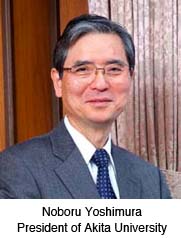From the 21st century COE to the Global COE: aiming to advance cutting-edge research and contribute to medicine

It was 2002 when the 21st century COE was commenced with the purpose of developing the footholds for high-level research and education for researchers. In the first year, the life science section was examined, and 28 places were selected; in which, the “cell fate determination control” program of Faculty of Medicine, Akita University was included.
Our university is a small local national university and the history of our faculty of medicine is as short as some 30 years, but the employment and training of excellent teaching staff and researchers, the achievements so far, and the future schemes, etc. have been highly evaluated. This fact invigorated all of our university staff to a considerable degree.
The 21st century COE program ended in March 2007, but our university recruited full-time researchers globally via Nature, etc., submitted papers to prestigious academic journals, including Cell, Nature, and Science, and marked A in the interim review in 2004, and so on. We are proud of these things, living up to the national project.
It was announced that from fiscal 2007 the improved version of Global COE would be commenced, and our university also started designing a new project for further progress, without stopping our valuable work in the life science field. We were confident in our 5-year achievements, but in order to enrich our research objectives and contents, we initiated the collaborative research scheme with Gunma University, which produced splendid results under the theme of “the reception and transmission of biological information, and the expression of functions” in the life science field.
Its objective was to develop integrated collaborative research, while pursuing the subjects specialized in by each university: the immunity of the general regulation system of the biological body (Akita University) and neuroscience and endocrinology (Gunma University). In June, this research was adopted. In the present project, only 13 research strongholds were selected.
In the near future, we plan to make shared policy for nurturing graduate students and young researchers and jointly establish “Biological Information Signal Center.” Both universities are small local ones, but produced some achievements that were highly evaluated in Japan and overseas. In this Global COE program, we will further enrich our cutting-edge research and contribute to medicine.